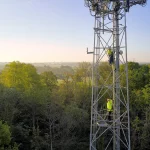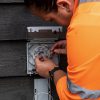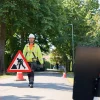Openreach Boosts UK EV Van Charging with First Bus Deal

Network access provider Openreach, which is currently in the process of upgrading all of their c. 29,000 fleet of UK diesel vans and cars to electric (EV) by March 2031 (3,000 have already been done), has given their plans another boost by reaching a deal that will allow their fibre broadband engineers to use First Bus’ existing chargers.
First Bus is one of the UK’s largest bus operators, operating buses as far north as Aberdeen in Scotland to as far south as Cornwall in South West England. But much like Openreach, they’re also busy rolling out an electric bus fleet across the UK (due to complete by 2035), with over 600 zero emission buses expected to be deployed by the end of March 2024. The company operates a total of 4,500 buses.
The new deal will grant Openreach’s engineers’ access to First Bus’ rapid Electric Vehicle (EV) charging infrastructure at bus depots nationwide. DPD and Police Scotland have also previously agreed similar access to the shared infrastructure.
Advertisement
Faizan Ahmad, Decarbonisation Programme Director at First Bus, said:
“We’re excited about this collaboration, showcasing the power of teamwork to reduce carbon emissions and improve air quality in the communities we serve. The shift to electric is a journey for businesses nationwide, and we are offering a smart, community-friendly solution that’s simple, effective, and benefits everyone.”
Robert Thorburn, Openreach Scotland’s Partnership Director, said:
“We are excited to try a new approach with First Bus that can potentially help both our businesses. As two major fleet operators in the UK, it makes sense for us to explore the most efficient ways to power up our electric vans and buses.
First Bus has made a massive investment in charging infrastructure and using their empty stations to juice up our vans will take pressure off public charge points. Our engineers often live in flats or apartments where charging is not yet an option, so this will make life easier for them too.”
The initial phase of the partnership will see up to 30 Openreach Electric Vehicles from its fleet charging at First Bus depots in Glasgow, Aberdeen, and Leicester while buses are in service.
Mark is a professional technology writer, IT consultant and computer engineer from Dorset (England), he also founded ISPreview in 1999 and enjoys analysing the latest telecoms and broadband developments. Find me on X (Twitter), Mastodon, Facebook, BlueSky, Threads.net and Linkedin.
« Court Trial to Start Over BT’s Alleged UK Landline Overcharging UPDATE
BT and EE Explore Starlink to Boost UK Broadband and Mobile »






















































Looking at the Gridwatch site today, we seem to be getting near to peak demand. Will it cope with all these electric vehicles? The culprits for all this madness are meeting in Davos as I type this.
Meanwhile, back in the real world, UK annual electricity consumption has been declining since about 2005.
https://www.gov.uk/government/statistical-data-sets/historical-electricity-data
Which madness do you refer to?
Maybe it’s the bacofoil haberdashery?
How on earth can you discern that from Gridwatch?
When You Capitalise The first Letter of Many [but not all] Of The Words in the Title, it Makes it Ambiguous.
Is it a deal with First Bus?
Or is it their first deal with [something to do with buses]?
Maybe try reading the actual article, clue is in the first paragraph.
When I looked at the Gridwatch site, demand was showing almost at max. Gas generation was almost at max. Wind generation was 15mw. Without the wind, I cannot see where the power will come from. Openreach on its own wants 29,000 electric vehicles, according to the article. The (un-elected) people at Davos are telling us we cannot have internal combustion engines. You do not need a tinfoil hat just to examine the facts. The Conservative Woman website sometimes comes up with people who know more about the subject than I do.
compare the UK with Germany
https://app.electricitymaps.com/zone/GB
the fact the others are not seeing is thet despite declining UK electrical & general energy usage since 1970’s, electric cars & heat pumps will see a huge transfer in energy usage from petrol/diesel/gas to electric & we currently don’t have the capacity to satisfy that demand & likely won’t for at least 20 years minimum.
when its cold, gloomy & not windy we depend on gas to fill the gaps from renewables.
its not difficult to see but some choose not to.